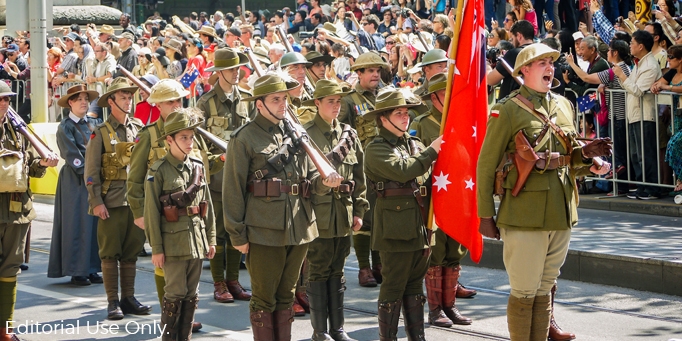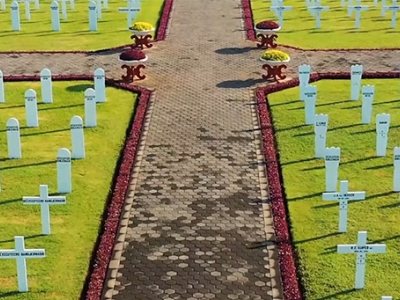
Why do Christians fight in wars?
Talking to kids about fighting for your country.
On occasions like Anzac Day, our kids can come up with some tricky questions. One that we’ve had to keep talking about as a family is whether it’s OK for Christians to fight in wars.
It’s not ideal
The first thing to talk about with our children is the fact that war is a product of living in a fallen world full of sinful people. Wars would not happen if groups of people were able to live side-by-side in perfect harmony—sharing their resources without greed or covetousness, overlooking the differences between them and treating one another with mutual respect.
But ever since humanity fell into sin, groups of people have been fighting against each other. Wars usually start because of disagreements over land, resources, leadership or ideology. Our children won’t find it hard to recognise the seeds of these kinds of disagreements in their own hearts and relationships, especially with their siblings.
But war always results in the destruction of life and property; it always affects both soldiers and civilians; it always ushers in a general state of instability, scarcity, distrust and fear.
War is never a good thing, even if it may sometimes be deemed necessary.
It’s not forever
War is a tragic consequence of living in a fallen world. Which means that war will no longer be present in the new heavens and new earth that God will bring about when Jesus returns. As Isaiah said:
In the last days,
the mountain of the Lord’s temple will be established
as the highest of the mountains;
it will be exalted above the hills,
and all nations will stream to it.Many peoples will come and say,
Come, let us go up to the mountain of the Lord,
to the temple of the God of Jacob.
He will teach us his ways,
so that we may walk in his paths.’
The law will go out from Zion,
the word of the Lord from Jerusalem.
He will judge between the nations
and will settle disputes for many peoples.
They will beat their swords into plowshares
and their spears into pruning hooks.
Nation will not take up sword against nation,
nor will they train for war anymore. (Isaiah 2:2–4)
We long for that day when God will ‘break the bow and shatter the spear’ wielded in war (Psalm 46:9). How much more so our Christian brothers and sisters living in warzones across the globe!
It’s not personal
Our kids may notice the seeming contradiction between the commandments ‘Do not murder’ and ‘turn the other cheek’ and Christians fighting in a war, where they may have to end another person’s life. So it’s important to help our children understand the difference between murder and killing.
Murder is personal—it’s where an individual takes justice into their own hands and ends another person’s life for personal reasons like anger, hatred, jealousy or revenge. In regard to personal relationships, Paul instructs Christians:
Do not repay anyone evil for evil. Be careful to do what is right in the eyes of everyone. If it is possible, as far as it depends on you, live at peace with everyone. Do not take revenge, my dear friends, but leave room for God’s wrath, for it is written: ‘It is mine to avenge; I will repay’, says the Lord. On the contrary:
‘If your enemy is hungry, feed him;
if he is thirsty, give him something to drink.
In doing this, you will heap burning coals on his head.’ (Romans 12:17–20)
(As a side note, the phrase ‘heap burning coals on his head’ is most likely a reference to the burning fire of shame or a symbol of God’s judgement. That is, doing good to our enemies will make them burn with shame over their own sin. And we are free to do good to our enemies because we know that God will ultimately judge all sin.) 1
In personal relationships we are called to peace. But war is not personal. It’s a conflict between nations over national concerns. Soldiers do not fight for themselves, but as representatives of their country or people group. That means that when soldiers kill on the battlefield they are not committing ‘murder’ as forbidden by the commandments.
In a fallen world, we accept that some institutions have the right to use force against people in order to protect civilians. As Paul writes, ‘For the one in authority is God’s servant for your good … rulers do not bear the sword for no reason. They are God’s servants, agents of wrath to bring punishment on the wrongdoer’ (Romans 13:4). For example, the police keep the peace of our society by enforcing the rule of law. But sometimes keeping citizens safe involves the use of force against someone who wishes to do us harm. We can live our lives in relative peace and security knowing that those people in uniform are authorised to punish wrongdoers.
In a similar way, a nation may need to use its army to defend its own citizens or the citizens of an allied country against an aggressor. As we seek to explain these concepts to our children it may help to explain in simple terms the circumstances behind World War I, World War II, the Vietnam War and other international conflicts that Australia has been involved in. We can give our own perspective on whether these circumstances really merited Australia sending soldiers into foreign warzones.
It’s not unanimous
As we talk about war to our children, we can explain that in most conflicts throughout Australia's history soldiers voluntarily chose to go to war. Other people chose to support the war effort in different ways, behind the front lines or on the home front. However, at some points in history, such as during the Vietnam war, men were conscripted into the army and had no choice about whether or not to fight. In history, those who refuse to fight because they sincerely believe it is wrong to engage in any form of military service are called ‘conscientious objectors’.
When it comes to the question of whether Christians should join the armed forces, there are differing opinions. Some Christian traditions have a long history of pacifism and believe that all violence is wrong. The 2016 movie Hacksaw Ridge told the story of one such pacifist, Seventh-day Adventist Desmond Doss, who chose to serve as a medic in World War II, but refused to pick up any form of weapon against a fellow human being. His story showed how one Christian found a way to support their country without going against their conscience.
Other Christians accept the ‘just war theory’ that sometimes, a war can be a necessary and appropriate response to evil. For this to be true, there should be a ‘just reason for war’, ‘just conduct in war’ and a ‘just outcome of war’. Under these circumstances, a Christian could fight for their country with a clear conscience. In fact, some Christians would see coming to the defence of vulnerable people groups as an expression of 'loving your neighbour' (Matthew 22:38).
Some Christians also point to the fact that when soldiers came to John the Baptist, he didn’t tell them to repent of their profession, but simply said: ‘Don’t extort money and don’t accuse people falsely—be content with your pay’ (Luke 3:14). Throughout history, many soldiers' lives have exemplified Jesus' words: 'Greater love has no one than this: to lay down one’s life for one’s friends' (John 15:13).
Whatever our personal views on war may be, occasions like Anzac Day present a good opportunity to discuss this difficult topic with our children. Let’s pray that God gives us great wisdom and grace as we talk about it together. And as far as it depends on us, let’s seek to be ‘peacemakers’ as we wait in hope for the day when God ‘makes wars cease to the ends of the earth’ (Psalm 46:9).
Footnotes
1. Schreiner, T 1998, Romans (Baker Exegetical Commentary on the New Testament), Baker Academic, Grand Rapids, pp. 673–676.
References
Eternity news, 'What does the Bible say about war?', by David Deane.
The Gospel Coalition Australia, 'Should Christians ever say 'yes' to war?' by Akos Balogh.

A New Freedom
This book is like a training manual on how to approach life—a beginner’s guide to Christian ethics. It provides a framework for approaching any topic in a comprehensive and biblically faithful way, explaining why Jesus and his word help us live in freedom.
For more articles from Growing Faith, subscribe to our monthly e-newsletter.
To hear about the latest books and resources from Youthworks Media, subscribe here.






